План-конспект уроку "Природні катаклізми. Умовні речення"
План конспект уроку складено для учнів 8 класу спеціалізованих шкіл з поглибленним вивченням англійської мови, до узагальнюючого уроку за темою "Природні катаклізми" до НМК ( Solutions Pre-Intermediate Unit 8) Метою уроку є узагальнення лексичних знань до теми уроку, вживання їх на практиці та відбрацювання граматичної теми" Умовні речення!"
Lesson plan Form: 8-V
Topic: Natural disasters. Second conditional
Main aims: to review and expand vocabulary related to natural disasters; to practise the usage of Second Conditional,
Subsidiary aims: to improve speaking skills through a debate and pupils reports, to develop listening skills
All students will be able to: -define each natural disaster and its properties;-provide basic information about natural disasters;-practice and expand their vocabulary on the topic;
Most students will be able to: -research one type of natural disaster in depth;-discuss their attitude to natural disasters;
Some learners will be able to: analyze the worsening ecological situation on our planet and suggest their ways of solving it.
All the students will be able to talk about imaginary situation and its consequences.
Materials: a CD player, a projector, a screen, iTools (Solutions pre-Intermediate), TRCD-ROM, students’ reports and presentations, movie activity(https://vk.com/videos184583605), presentation “Second conditional”, computers with Internet access (or printed information on various natural disasters from the web).
|
Timing
|
Procedure |
Subsidiary aims |
Aids
|
Interaction pattern |
|
3 m
|
Warm up |
Getting ready for the lesson
|
Statement |
T-Ps |
|
5 m |
Vocabulary work |
Activating vocabulary to the topic |
Flashcards, cards with transcription |
T-P1-P2 |
|
5 m |
Listening practice
|
Improving listening skills
|
CD-player |
P1-P2-P3 |
|
9 m |
Speaking practice |
Developing speaking skills |
Students’ reports, presentations |
P-Ps |
|
3 m |
Break |
Having rest |
Video material |
|
|
18 m
|
Grammar practice |
Learning and practicing the use of the Second Conditional
|
Computer, projector, presentation |
T-Ps P1-P2-P3 |
|
2 m
|
Summing up |
Making conclusions, grading, giving home task |
|
|
Procedure
1. Greeting and organization.
2. Warming up. On the board “ Never make fun of someone who speaks broken English. It means they know another language!)) (J. Brown) Give 1-2 minutes to think about this and then get some feedback from the class by asking a few students their opinions.
3. Set Expectations. Good morning, ladies and gentlemen. Take your seats and get ready for the lesson.
Today we’re going on talking on the topic Natural disasters. Today’s activities will help us to review all that we learned about disasters, develop our listening and speaking skills. The main aim of our lesson is grammar practice. It is the Second Conditional. Print “Disaster” on the board. Tell students, You are going to come up with as many words as you can that are related to the word “disaster,” and then we’ll put these ideas together to get a really good sense of what a thing has to be in order to be labeled a natural disaster
4. Motivate and Focus Ask students to define the word “disaster.” (A disaster is an event that causes a lot of damage and harm.) Ask: What does it mean to say a tornado is a “natural disaster?” (It’s a disaster caused by nature.) Today, we are going to brainstorm different kinds of natural disasters
5. Oral practice. Tell students: First, I am going to put the words “natural disasters” in the center of this map. This map is going to help us pull together all the pieces of our ideas about natural disasters. Now, I want you to think of some examples of natural disasters. List these examples on chart paper hanging next to map. As volunteers name disasters, ask them what they know about each ones. What is it? Have they ever experienced it? Have they seen it on television or in movies? Use students’ explanations to write a brief definition beside each word
6. Listening. Pre-listening task. “Drawing game.” Copy and cut up a set of the word cards. Divide the board in two and the students into two teams. Ask one volunteer from each team to come up to the board and show both students one of the word cards. Ask them to draw the word on the board and their team must guess what it is. The first team to guess the word wins a point. Two more students come up to draw the next word, and so on. (e.g. tsunami, volcanic eruption, flood, drought)If your students aren’t up for drawing, use the word cards for them to simply take and describe the word to the group. The student who guesses the word correctly wins the card. The student with the most cards wins. Suggested words to use: a) Snowboarders found alive under 5 m of snow;(avalanche) b)Heat and smoke force animals from their homes.(forest fire) c) Roads were under tonnes of rock and mud(landslide)
While-listening task. Listen to ten people talking. Decide which natural disaster each person is speaking about. Play the recording, pausing after each speaker to allow students time to choose a natural disaster. Students check their answers in pairs. If necessary, play the recording a second time without stopping. Check answers as a class. (Solutions Pre-Intermediate Unit 8, 8-A Ex.5 (3.14) KEYS: 1-avalanche 2-disease 3- flood 4-tsunami 5-earthquake 6-volcanic eruption 7-drought 8-forest fire 9-landslide 10-famine
Post-listening task. Tell some words about one of natural disasters you have heard.
7. Speaking. Students’ reports or presentations about
- The Great Fire of London
- The Great Plague of London
- Groundwater flooding in the UK: January 2014
Having rest: video
8. Grammar Practice
As I have said at the beginning of the lesson we’ve got some new grammar today. It is the continuation of the topic Conditional sentences. Let’s remember some things about them.
1) Zero conditional (Students tell the rule and give their examples)
2) First conditional. Movie activity (https://vk.com/videos184583605) Reproduce the conversational turns with the first conditionals.
Let’s get acquainted with the Second Conditional. Here is the conversation that took place between Winston Churchill, a British politician and statesman, and Nancy Astor, the first woman to sit as a Member of Parliament, at a dinner party:
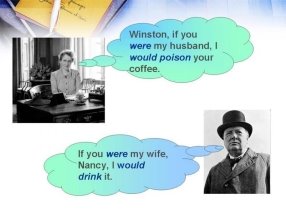
Are these conditional sentences real? What time do they refer to: past or present? What tenses are used in these sentences? (Pupils try to answer the questions.)
Let’s study the rule of using the verb to be in such sentences and some more examples.
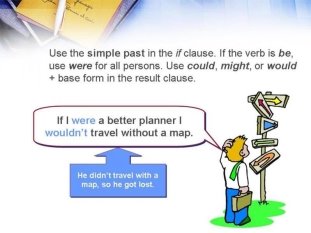
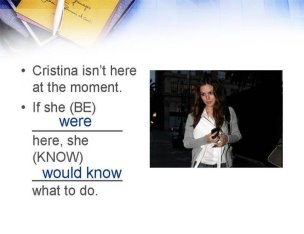
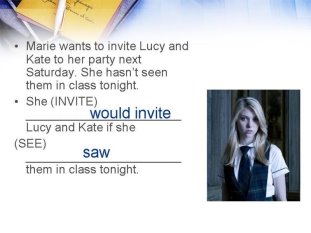
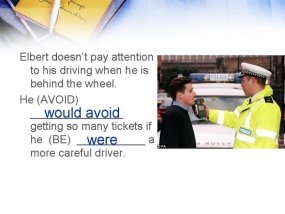
Grammar practice.
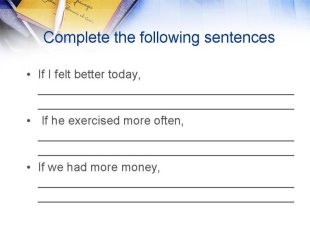
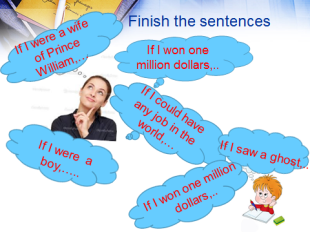
III. Summing up the lesson
You have been working hard and your marks are… Your home task for the next lesson is a) Solutions Pre-Int. Grammar Builder p.118 Ex.1-3; b) To make a report about natural disasters in Ukraine.
Розробка відкритого уроку
з англійської мови до теми
«Природні катаклізми.
Умовні речення» (8 клас)
вчителя англійської мови
Харківської гімназії №12
Пивоварової Л.І.
Харків 2016
|
|
Roads were under tonnes of rock and mud |
Snowboarders found alive under 5 m of snow |
|
|
No rain for a long time
|
When lots of people die because there isn’t enough food |
|
|
|
|
|
Water levels stills rising as rain continues
|
Heat and smoke force animals and people from home |
|
Roads were under tonnes of rock and mud
|
Snowboarders found alive under 5 m of snow |
|
No rain for a long time
|
When lots of people die because there isn’t enough food
|


про публікацію авторської розробки
Додати розробку
